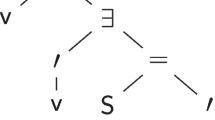Abstract
In the first part we show why ordinals and ordinal notations are naturally connected with proof theoretical research. We introduce the program of ordinal analysis. The second part gives examples of applications of ordinal analysis.
Similar content being viewed by others
References
Barwise, J.: Admissible sets and structures. Perspectives in Mathematical Logic. Berlin Heidelberg New York: Springer 1975
Buchholz, W.: Normalfunktionen und konstruktive Systeme von Ordinalzahlen. In: Diller, J., Müller, G.H. (eds.) ISILC — Proof theory symposium. (Lect. Notes Math., vol. 500, pp. 4–25) Berlin Heidelberg New York: Springer 1975
Buchholz, W., Feferman, S., Pohlers, W., Sieg, W.: Iterated inductive definitions and subsystems of analysis: recent proof-theoretical studies. (Lect. Notes Math., vol. 807) Berlin Heidelberg New York: Springer 1981
Buchholz, W., Schütte, K.: Ein Ordinalzahlenbezeichnungssystem für die beweistheoretische Abgrenzung derΠ1/2-Separation und Bar-Induktion. Sitzungsber. Bayer. Akad. Wiss. Math.-Naturwiss. Kl. (1983)
Buchholz, W.: A new system of proof-theoretic ordinal functions. Ann. Pure Appl. Logic32, 195–207 (1986)
Buchholz, W., Wainer, S.S.: Provably computable functions and the fast growing hierarchy in mathematical logic and combinatorics. In: Simpson, S. (ed.) Proc. of the AMS-IMS-SIAM (AMS-ser. Contemp. Math., vol. 65, pp. 179–198) Providence-Rhode Island: AMS 1987
Buchholz, W.: Notation systems for infinitary derivations. (This volume)
Cichon, E.A., Wainer, S.S.: The slow growing and the Gregorczyk hierarchies. J. Symp. Logic48, 399–408 (1983)
Feferman, S.: Systems of predicative analysis. J. Symb. Logic29, 1–30 (1964)
Feferman, S.: Formal theories for iterated generalized inductive definitions and some subsystems of analysis. In: Kino, A., Myhill, J., Vesley, R.E. (eds.) Intuitionism and proof theory. Proceedings of the Summer Conference at Buffalo, New York. Amsterdam: North-Holland 1970
Gentzen, G.: Die Widerspruchsfreiheit der reinen Zahlentheorie. Math. Ann.112, 493–565 (1936)
Gentzen, G.: Beweisbarkeit und Unbeweisbarkeit von Anfangsfällen der transfiniten Induktion. Math. Ann.119, 140–161 (1943)
Girard, J.Y.:Π 21 -logic, part I: dilators. Ann. Pure Appl. Logic21, 75–219 (1981)
Girard, J.Y.: Proof theory and logical complexity. Studies in proof theory. Naples: Bibliopolis 1987
Moschovakis, Y.: Elementary induction on abstract structures. Amsterdam: North Holland 1974
Jäger, G.: Die konstruktible Hierarchie als Hilfsmittel zur beweistheoretischen Untersuchung von Teilsystemen der Analysis und Mengenlehre. Dissertation, München, 1979
Jäger, G.:ϱ-inaccessible ordinals, collapsing functions, and a recursive notation system. Arch. Math. Logik Grundlagenforsch.24, 49–62 (1984)
Jäger, G.: Theories for admissible sets: a unifying approach to proof theory. (Habilschrift at the University of Munich) Naples: Bibliopolis 1986
Jäger, G., Pohlers, W.: Eine beweistheoretische Untersuchung von (Δ1/2−CA)+(BI) und verwandter Systeme. Sitzungsber. Bayer. Akad. Wiss. pp. 1–28 (1982)
Löb, H.H., Wainer, S.S.: Hierarchies of number-theoretic functions. Arch. Math. Logik Grundlagenforsch.13, 39–51 & 97–113 (1970)
Pohlers, W.: Proof-theoretical analysis ofID v by the method of local predicativity. In: Buchholz, W., Feferman, S., Pohlers, W., Sieg, W. (eds.) Iterated inductive definitions and subsystems on analysis: recent proof theoretical studies. (Lect. Notes Math., vol. 897, pp. 261–357) Berlin Heidelberg New York: Springer 1981
Pohlers, W.: Contributions of the Schütte school in Munich to proof theory. In: Takeuti, G. (ed.) Proof Theory, 2nd edn. Amsterdam: North Holland (1987)
Pohlers, W.: Ordinal analysis of KPi. Chapter I Ordinals. Mimeographed preprint Münster (1988)
Pohlers, W.: Proof theory: an introduction. (Lect. Notes Math., vol. 1407) Berlin Heidelberg New York: Springer 1989
Rathjen, M.: Untersuchungen zu Teilsystemen der Zahlentheorie zweiter Stufe und der Mengenlehre mit einer zwischen (Δ1/2-CA) und (Δ1/2 — CA +BI) liegenden Beweisstärke. Dissertation, Münster (1989)
Rathjen, M.: Ordinal notations based on a weakly Mahlo ordinal. Arch. Math. Logic29, 249–263 (1990)
Rathjen, M.: Proof theoretic analysis of KPM. Arch. Math. Logic30 (1990)
Schütte, K.: Beweistheorie. Berlin Heidelberg New York: Springer 1960
Schütte, K.: Eine Grenze für die Beweisbarkeit der transfiniten Induktion in der verzweigten Typenlogik. Arch. Math. Logik Grundlagenforsch.67, 45–60 (1964)
Schütte, K.: Predicative wellorderings. In: Crossley, J.N., Dummett, M. (eds.) Formal systems and recursive functions, pp. 176–184. Amsterdam: North Holland 1965
Schütte, K.: Proof theory, 2nd edn. Berlin Heidelberg New York: Springer 1977
Smith, R.L.: The consistency strengths of some finite forms of the Higman and Kruskal theorems in Harvey Friedman's research on the foundations of mathematics. In: Harrington, L.A., Morley, M., Scedrov, A., Simpson, S.G. (eds.), pp. 119–136. Amsterdam: North-Holland 1985
Tait, W.: Normal derivability in classical logic. In: Barwise, J. (ed.) The syntax and semantics of infinitary languages. (Lect. Notes Math., vol. 72, pp. 204–236) Berlin Heidelberg New York: Springer 1968
Tait, W.: Applications of the cut elimination theorem to some subsystems of classical analysis in intuitionisms and proof theory. In: Kino, A., Myhill, J., Vesley, R.E. (eds.) Intuitionism and proof theory. Proceedings of the summer conference at Buffalo, N.Y. 1968, pp. 475–488. Berlin Heidelberg New York: Springer 1970. Kino et al. eds. Springer (1970)
Takeuti, G.: Proof theory, 2nd ed. Amsterdam: North Holland 1987
Veblen, O.: Continuous increasing functions of finite and transfinite ordinals. Trans. Am. Math. Soc.9, 280–292 (1908)
Wainer, S.S.: A classification of the ordinal recursive functions. Arch. Math. Logik Grundlagenforsch.13, 136–153 (1970)
Wainer, S.S.: Ordinal recursion and a refinement of the extended Grezgorczyk hierarchy. J. Symb. Logic37, 281–292 (1972)
Weiermann, A.: Vereinfachte Kollabierungsfunktionen und ihre Anwendungen. Preprint Münster (1989)
Author information
Authors and Affiliations
Additional information
Dedicated to K. Schütte on the occasion of his 80th birthday
Work partly supported by a grant of the Volkswagenstiftung
Rights and permissions
About this article
Cite this article
Pohlers, W. Proof theory and ordinal analysis. Arch Math Logic 30, 311–376 (1991). https://doi.org/10.1007/BF01621474
Received:
Issue Date:
DOI: https://doi.org/10.1007/BF01621474




